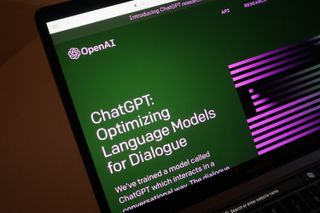Rather than pretend ChatGPT doesn’t exist, Dr. Francine Berman told students in her Introduction to Public Interest Technology at the University of Massachusetts Amherst this spring that they could use the artificial intelligence (AI) tool to help them write their papers, if they wanted to.
Because Berman regularly assigns work that requires a good deal of personal reflection, ChatGPT wouldn’t be able to generate complete papers for students, however, it could help with outlining and draft generation. ChatGPT might also offer editing advice or suggestions if students asked it to read their papers and provide suggestions.
“Those responses may or may not be useful, and they may or may not be better writing than yours, and they may or may not be correct,” Berman, Director of Public Interest Technology at UMass, told students. “But you can often select things that strike you as working and then incorporate it back in your own writing, as you would in interacting with a human developmental editor.”
However, Berman warned students that using ChatGPT had potential perils. “I made it clear to the students that ChatGPT’s privacy policies aren't very good for the individual, and that the writing is often kind of mediocre," she says.
While staff members at OpenAI, which developed ChatGPT, were preparing Educator Considerations for ChatGPT, a web resource, they heard about Berman’s approach and reached out to her for input.
Here’s some of what Berman learned from using ChatGPT with her students.
Not Every Student Used ChatGPT and It Wasn’t Always Helpful
Even though they were permitted to use ChatGPT to help hone their writing, not every student took that opportunity. “Some of them didn't like the privacy policy, or chose for whatever reason not to use it,” Berman says.
Also, as anyone who has experimented with ChatGPT has likely found, the advice it offers can lead you astray. “It didn't always improve their writing,” she said. “I had them show me samples of the stuff that they came up with and stuff that ChatGPT came up with.”
However, there were also times when ChatGPT did help students. For example, it could provide a unified tone to group projects, and was particularly helpful to students who knew the course material well but struggled with writing mechanics.
“It was a game changer for students for whom English was not their first language,” Berman says. “A lot of times those students have trouble with really subtle things like tense or verb agreement or plural [words]. ChatGPT helped smooth that out for them.”
In the past, Berman might suggest students with these struggles go to the writing center, where a human tutor might provide similar feedback on their work. Used in this manner by students, Berman believes ChatGPT can act as a more responsive, if less personal, writing center tutor, even though she acknowledges that ChatGPT will not be replacing campus writing centers anytime soon.
Chat GPT Can Be A Co-Pilot Not The Pilot
Despite the potential Berman sees for using ChatGPT as a writing helper or AI editor, she believes human writing is vital.
“It's really, really important for all of us to write well. We need to share ideas. Even the well-written email is incredibly powerful,” she says. “Students need to write. All of us need to write well.”
By allowing students to work with ChatGPT, she hopes to teach them how to use it to improve their writing, not merely write for them. “My big point in helping the students with that is we live in a world where there is increasingly going to be more and more AI resources,” she says. “We're in danger if we expect these resources to be the pilot, but I think that it will be more and more possible to have these resources be the co-pilot.”
Human writers should still be the ones vetting the information AI generates and making the final decision, however, students need to learn and practice those vetting AI skills. “I wanted them to get some real-world examples of that in class because I think they're going to encounter that more and more,” Berman says.


